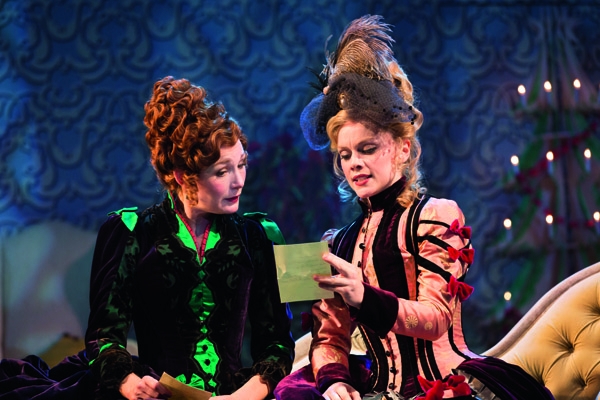Pinero’s comedy The Magistrate is a marvellous confection of shameful secrets and multiplying concealments. Agatha, a beautiful widow of 36, has trimmed five years from her age in order to bag her second husband, Aeneas Posket, an agreeably pompous magistrate. Her subterfuge is imperilled by her 19-year-old son who must pretend to be 14 in order to make the maths work. To please his mother, the young buck behaves like a child at home. But elsewhere he pleases himself. He keeps a private room at the racy Hotel des Princes in town. One evening, he persuades his weakling stepfather to accompany him for a night of drunken antics. The police swoop on the hotel and Posket has to run pell-mell from the officers of the law. Agatha, visiting the same venue on an innocent errand, is caught up in the raid. In court the following morning, Posket must pass judgment on his own wife. Back at home, he faces her furious indignation but she, in turn, is compelled to confront her prenuptial fibs.
The script runs like a piece of comic clockwork and delivers gags at the dependable rate of two per minute. Pinero had the intellect of a great jurist, and he crams his play with moments of subtle and delicate comedy. For example, Agatha excuses her lies by claiming altruistic motives: she merely wished to spare her future husband the painful awareness of too many years lived without the benefit of his loving companionship.
Timothy Sheader’s crisp direction suffers from a couple of technical lapses. Tricky scene changes are masked by a troupe of dancers who keep blundering on stage to kick up their legs and perform irrelevant comic lyrics written by Richard Stilgoe. The show would zip along faster without these longueurs. The design by Katrina Lindsay violates the first rule of drama: let nothing speak louder than text. Instead of giving us simple, homely Victorian settings, Ms Lindsay dumps the action in a space-age starburst of indentured polystyrene, and she litters the stage with bits of antique furniture upholstered in hideous sweetie-jar colours. Gruesome. The eye takes 20 minutes to adjust to these ugly monstrosities. By contrast, her costumes are superb. Avoiding the frivolous complexities of her sets, she honours the decorative elegance of the period. The men wear sombre and dignified evening clothes. The ladies flit about like gorgeous butterflies in sumptuous pleated robes.
These minor blunders are more than compensated for by a handful of great performances. John Lithgow is well cast as the dour but amiable Posket. He speaks in a faultless BBC accent throughout except in moments of high passion when he drawls like Tony Curtis. This scarcely matters. No actor can simulate the depths of rage without letting his home-grown enunciation take over. As his wife, Nancy Carroll is truly brilliant. Her spiky wit and truculent spirit are tempered by her smouldering sexual allure. A prize-winning turn, surely. She receives excellent support from Jonathan Coy playing a red-cheeked buffoon named Colonel Lukyn, whose soldierly honour is compromised when he’s packed off for a night in the police cells. Released, in the final scene, he delivers this epitaph on his vanquished dignity. ‘I have been washed by the authorities!’ His comic swagger is touched by a sort of tragic grandeur and he suggests powerful hints of Oliver Reed at his best. Coy got the loudest cheers during the curtain call. This is a terrific seasonal treat.
At Soho Theatre, there’s an all-male version of A Clockwork Orange. It’s hard to divine Anthony Burgess’s artistic purpose in his pretentious and relentlessly nasty novella. The lead thug, Alex, is a charismatic teetotaller fascinated by German orchestral music. He has enough of Adolf Hitler about him to suggest that Burgess wished to dissect Nazism in the way that Orwell had done Marxism-Leninism in Animal Farm. The problem is that the ‘ultra-violence’ is so realistic that censure turns into glorification. Alexandra Spencer-Jones’s staging aims to convert the batterings and gang rapes into a stylish choreographic romp, like West Side Story. Some hope. The show looks like a warm-up for a sadomasochistic gay porn video.
Back in the 1970s we were told that ‘death threats’ had forced Stanley Kubrick to withdraw his film version of this story from British cinemas. Perhaps there was a simpler motive. He knew he’d hit rock-bottom and made a preposterous and brutal movie of which he was rightly ashamed. And he swiftly atoned for it with his masterpiece, Barry Lyndon. This production is proving popular with Soho’s fashionable crowd, who chortle approvingly as the squad of psychos kick and smash their way through the script. Pretty boys in a pretty unedifying spectacle.







Comments